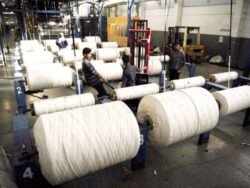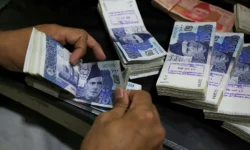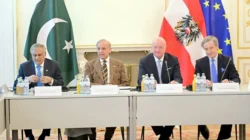PAKISTAN’S ECONOMIC RENAISSANCE THROUGH GULF INVESTMENTS UNDER THE SIFC FORUM

By: Maria Mansab
The establishment of the SIFC signifies a critical turning point in the economic development of Pakistan. With the dual objective of stimulating economic growth and attracting foreign investments, SIFC is at the forefront of efforts to expedite economic development and attract foreign investments. Under the leadership of Caretaker Prime Minister Anwar-ul-Haq Kakar, the SIFC’s apex committee convened on Wednesday to discuss a bilateral investment treaty with Saudi Arabia and Qatar that would seek to attract multibillion-dollar investments. Pakistan has opened its doors to Gulf investment through the SIFC forum.
Before this, Pakistan and Saudi Arabia reached an agreement under the SIFC forum to establish a bilateral legislative framework, which is necessary to facilitate significant Saudi investment in Pakistan. Pakistan is actively endeavoring to attract significant investments from potential investors by satisfying all their demands and making considerable efforts. SIFC played a pivotal role in developing and completing a comprehensive investment framework for Saudi Arabia’s investments in Pakistan.
Notably, Pakistan has already secured a monumental $25 billion investment commitment from Saudi Arabia. It also attracts significant investment from the UAE, Kuwait, and Qatar, for which the SIFC is working hard to create an investment-friendly environment in Pakistan. SIFC also developed a Visa Policy, whereby Pakistan will provide priority visas to nationals of these countries to expedite the implementation of the schemes.
In a groundbreaking development, Pakistan successfully finalized 10 lucrative multibilliondollar agreements with Kuwait during the Prime Minister’s visit to the Gulf region. Moreover, seven agreements have been signed to secure multi-billion-dollar investments from Kuwait in several sectors of Pakistan. These sectors include food security/agriculture, hydel power, water supplies (specifically safe drinking water and supporting mining activities), the establishment of a mining fund to support the mineral industry, the development of technology zones, and the preservation of mangroves.
The government has identified 23 countries for foreign investment, with a primary focus on Saudi Arabia, the United Arab Emirates, Qatar, and Bahrain. The SIFC’s apex committee approved a corporate farming project on 10,000 acres in the Cholistan desert, which will ultimately be expanded to 85,000 acres. Qatar has expressed particular interest in this project, aligning with its food security objectives.
With the long-term goal of reducing dependency on loans and imports, Pakistan has in principle approved 28 projects worth billions of dollars under the SIFC forum that would be made available for investment in Gulf countries. The authorized projects indicate that the total amount of investment under the SIFC banner might surpass the $28 billion under the CPEC if all of the schemes are adopted by nations like Qatar, Saudi Arabia, the United Arab Emirates, and Bahrain.
The SIFC has approved the investment of $10 billion in a Saudi Aramco oil refinery and the TAPI Gas Pipeline Project. SIFC has authorized the establishment of technological zones, an initiative aimed at attracting investment in the optical fiber network, the creation of cloud infrastructure, and the development of a semiconductor designer. Additionally, SIFC has approved the manufacturing of smart products, the implementation of a global skill hub plan, and the establishment of several centers of excellence.
Several significant projects in the power sector have been identified to be shared with
Gulf countries for investment purposes. The projects mentioned are the Diamer-Bhasha Dam, which has a value in the billions of dollars, and Thar Coal Block II. The solar PV project at the Layyah and Jhang sites has also received approval.
The primary purpose of SIFC is to effectively coordinate and facilitate various federal and provincial entities to eliminate obstacles and ensure a seamless process for foreign investment. Insufficient cooperation between various ministries and provinces led to the establishment of the SIFC. Investors anticipate a timely reaction and expeditious approvals. SIFC serves as a comprehensive and efficient option for investors.
Pakistan has established the SIFC to promote collaboration between the federal and provincial governments to allow prompt decision-making, prevent redundant efforts, boost investor trust, and ensure efficient project execution. The foundation of the SIFC symbolizes Pakistan’s dedication to revitalizing the economy and attracting global investments.





